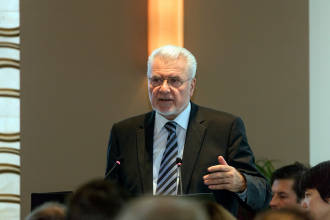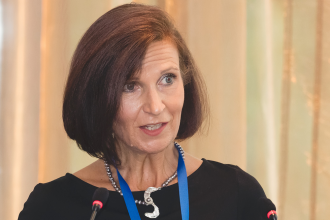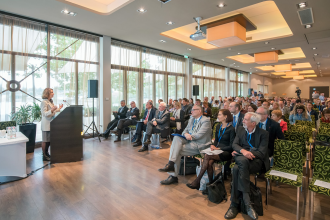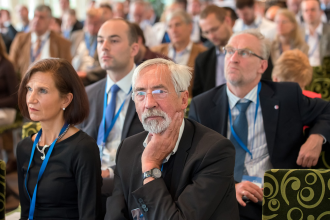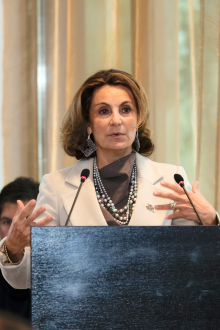A „Central European Cooperation for Industry 4.0" című rendezvény 14 országból regisztrált résztvevőinek legérdekesebb konferenciatémái az emberek és robotok együttműködéséről, az okos gyárak adatkezeléséről és folyamattervezéséről szólnak.
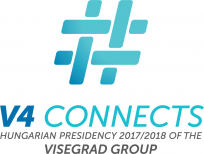 Az információs technológia és az automatizálás egyre szorosabb összefonódásával újabb ipari gyártási módszereket eredményező fejlesztési projektek budapesti seregszemléjének célja a nemzetközi pályázati programokban való eredményes részvétel ösztönzése.
Az információs technológia és az automatizálás egyre szorosabb összefonódásával újabb ipari gyártási módszereket eredményező fejlesztési projektek budapesti seregszemléjének célja a nemzetközi pályázati programokban való eredményes részvétel ösztönzése.
A hazai vállalkozások és kutatóhelyek akkor maradhatnak versenyképesek, ha erősíteni képesek regionális és globális kapcsolataikat a magas hozzáadott értékű termeléssel összefüggő ipari termelési rendszerek és technológiák fejlesztése terén – hangsúlyozta a rendezvény nyitóeseményén Pálinkás József, az NKFI Hivatal elnöke.
A rendezvényen köszöntőt mondott Lepsényi István, a Nemzetgazdasági Minisztérium gazdaságfejlesztésért és -szabályozásért felelős államtitkára, valamint Vittoria Alliata di Villafranca, az Európai Bizottság Regionális és Várospolitikai Főigazgatóságának strukturális alapokért felelős vezetője.
Az NKFI Hivatal elnöke felhívta rá a figyelmet, hogy a Visegrádi Együttműködés 2017–2018-as magyar elnöksége alatt a tagországok vállalkozásai, kutatóhelyei közös projektjeinek, konzorciumainak ösztönzése az egyik legfontosabb törekvés, és hazánk ezt az irányt az ipar 4.0 területén is folytatni kívánja. Pálinkás József hozzátette, hogy a budapesti rendezvény kapcsolatépítési platform, amelynek célja hozzájárulni a régió országaiban működő vállalkozások és kutatóhelyek sikeres szerepléséhez a nemzetközi pályázati programokban. Az NKFI Hivatalt e törekvésében az Európai Bizottság Horizont 2020 innovációs pályázati keretprogramjáról 2017 nyarán publikált jelentés is megerősítette, amely szerint a nyertes pályázatokban részt vevő szervezeteknek mindössze 8,5%-a származik EU13 országból, amelyek a támogatások 4,4%-át nyerik el.
A rendezvényen John Cleuren, az Európai Bizottság gyártástechnológiai programokért felelős szakértője előadást tart a Horizont 2020 keretprogramnak a 2018–2020-as időszakra vonatkozó, várhatóan 2017 őszén megjelenő felhívásairól, amelyek tervezett keretösszege eléri az 1,6 milliárd eurót.
A konzorciumépítő rendezvényen résztvevő mintegy 100 szervezet között kiegyensúlyozott az innovatív vállalkozások és a kutatóhelyek aránya, amelyek többek között az okos termelési rendszerek, az intelligens minőségbiztosítási rendszerek, a virtuális valóságra épülő szimulációs technológiák, valamint a kiberbiztonság és a felhőszolgáltatások területén terveznek új projekteket. A rendezvény a finanszírozási és kapcsolatépítési lehetőségek bemutatásán túl a konkrét projektötletek bemutatására és pályázati együttműködések elindítására is teret biztosít a közép-európai régió vállalkozásainak és kutatási intézményeinek.
Kapcsolódó cikkek:
Szimulációs technológiák, kiberbiztonság és okos gyárak az Ipar 4.0 projekttalálkozón Budapesten
A RENDEZVÉNY PROGRAMJA
|
20 September 2017, Wednesday |
|
| 9:30-10:00 |
Registration |
| 10:00-10:30 |
Official opening of the event: Prof. József Pálinkás, president of National Research, Development and Innovation Office (NRDI Office) |
| Addressing the event: István Lepsényi, state secretary, Ministry for National Economy |
|
| Smart specialization cooperation in Central Europe initiative, Vittoria Alliata di Villafranca, Director, EU Commission; Directorate General for Regional and Urban Policy (DG REGIO) |
|
| |
|
| 10:30-10:50 |
INTERREG CENTRAL EUROPE third call for proposals: Thematic focus on regional smart specialisation strategies PDF (612 KB) |
|
Monika Schönerklee-Grasser, Head of Evaluation and Monitoring Unit, Interreg Central Europe Joint Secretariat |
|
| 10:50-12:30 |
Presentation of relevant funding opportunities of Horizon 2020 and other funding programmes |
|
Horizon 2020, “Nanotechnologies, Advanced materials, Advanced manufacturing and processing, and Biotechnology” programme in 2018-2020 PDF (1 253 KB) John Cleuren, European Commission, DG Research & Innovation, Senior Expert, NMBP Call Coordinator |
|
| Presentation of other funding programmes (H2020 ICT, EUREKA, EUROSTARS, ECSEL) NRDI Office speakers |
|
|
|
| Q & A |
|
| 12:30-13:30 |
Buffet Lunch |
| |
|
|
13:30-18:50 |
Industry 4.0 – in practice: |
|
Keynote panel on future trends, thematic sessions with industry representatives and introduction of project ideas in advanced manufacturing |
|
| |
|
|
13:30-15:30 |
Future trends of Industry 4.0 - Panel discussion with keynote speakers |
| |
Moderator: Prof. László Monostori |
|
Introduction – Industry 4.0: New rooms for cooperation PDF (1 651 KB) Prof. László Monostori, , director of Institute for Computer Science and Control, Hungarian Academy of Sciences; & Budapest University of Technology and Economics |
|
|
Strategies for reindustrialization of European industries PDF (693 KB) Prof. em. Engelbert Westkämper, University of Stuttgart & Fraunhofer Institute for Manufacturing Engineering and Automation IPA |
|
|
Industry 4.0: An industrial view PDF (3 154 KB) Mr. Joerg Bauer, President of General Electric Hungary |
|
|
Demanufacturing and Remanufacturing Systems for Circular Economy PDF ( 5 388 KB) Prof. Tullio Tolio: director of Institute for Industrial Technologies and Automation –National Research Council of Italy (ITIA–CNR) & University of Polytechnic, Milano |
|
|
Human centred cyber-physical assembly PDF (930 KB) Prof. Sebastian Schlund, Technical University, Wien; |
|
|
Cognitive Assistance Systems in Manufacturing PDF (1 700 KB) Mr. Lukas Merkel, Fraunhofer Research Institution for Casting, Composite and Processing Technology – IGCV |
|
| 15:30-15:50 |
Coffee break |
| |
|
| 15:50-17:30 |
Thematic sessions (in two separate rooms) |
| 1. |
Human-robot cooperation - from sensors to standards |
| moderator: József Váncza, Institute for Computer Science and Control, Hungarian Academy of Sciences (SZTAKI) |
|
|
|
|
Panel discussion, including Q & A |
|
| 2. |
Smart Factory: processing of production data, maintenance forecasting, manufacturing platforms, industrial internet, cyber-physical systems, High-Performance Manufacturing |
| Moderator: Prof. Charaf Hassan, Budapest University of Technology and Economics |
|
|
Participants:
|
|
|
Panel discussion, including Q & A |
|
| 17:30-18:50 |
Presentation of project ideas by the participants (3 minutes / presentation) |
|
|
| 18:50-19:00 |
Watify Campaign and opportunities for collaboration and partnerships development – Eleonora Zoboli, Watify, Technopolis Group |
|
|
| 19:00-22:00 |
Networking Buffet Dinner |
|
21 September 2017, Thursday |
|
| 8:30-9:00 |
Arrival |
| 9:00-9:15 |
Wrap up from day one - Brief summary of main conclusions from the Industry 4.0 project generating workshop |
|
Jack Engwegen – senior advisor DG REGIO, Pierre Padilla – IDEA Consult |
|
| 9:15-10:15 |
Presentation of platforms – examples of existing cooperation; Panel discussion |
| Moderator: Vincent Duchene – IDEA consult |
|
|
|
| 10:15-10:35 |
Coffee break |
| |
|
| 10:35-10:50 |
Introduction to Industry 4.0 matchmaking session – Eleonora Zoboli, Watify, Technopolis Group |
| Presentation of the Watify campaign and practical information on upcoming sessions, setting the scene for the multilateral working group meetings. |
|
| 10:50-11:50 |
Multilateral Working group meetings driven by Watify |
| Group 1: Human-robot cooperation from sensors to standards Moderator: Dr József Váncza, Institute for Computer Science and Control, Hungarian Academy of Sciences (SZTAKI); |
|
| Group 2: Smart Factory: processing of production data, maintenance forecasting, manufacturing platforms, industrial internet, cyber-physical systems, High-Performance Manufacturing Moderator: Eleonora Zoboli, Watify, Technopolis Group |
|
| 11:50-13:00 |
Matchmaking session driven by Watify – Eleonora Zoboli, Watify, Technopolis Group |
| |
Pre-arranged exploratory one-to-one meetings – based on a personalised agenda (max 30 min / meeting) with participants from Austria, Bulgaria, Croatia, Czech Republic, Germany, Hungary, Italy, Poland, Slovakia, Slovenia, Spain. |
| 13:00-14:00 |
Buffet Lunch |







